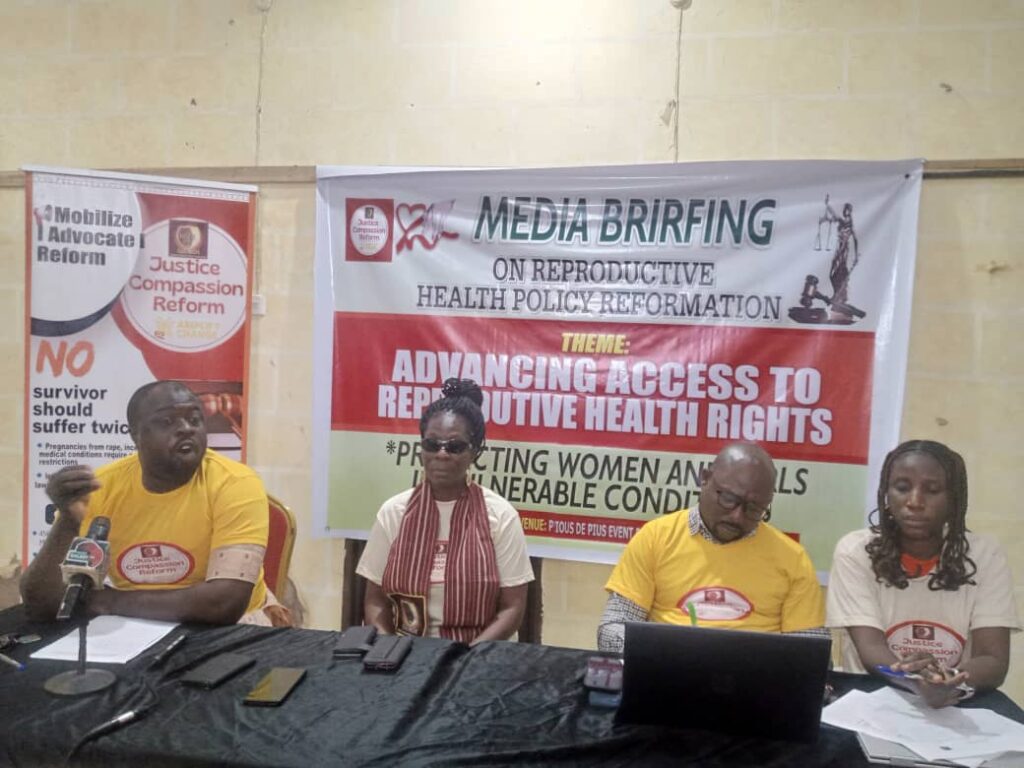…Seeks Law To Protect Victims Of Rape, Incest, Women With Life-Threatening Pregnancies
Daud Olatunji
The Gender Development Initiative (GenDi) has renewed its call on the Ogun State House of Assembly to urgently enact a Reproductive Health Law that would allow safe and legal termination of pregnancy in cases of rape, incest, and life-threatening medical conditions.
Speaking during a media briefing on “Policy Reformation and Maternal Mortality Reduction” held on Thursday in Abeokuta, the Executive Director of GenDi, Prof. Olubunmi Ashimolowo, and consultant to GenDi, Tayo Akinpelu jointly said the proposed law was not aimed at encouraging abortion, but at saving lives and protecting the dignity of victims of sexual violence and women with severe health risks.
“We are only pushing for three categories — survivors of rape, victims of incest, and women whose medical condition puts their lives at risk,” Ashimolowo explained.
Akinpelu added that the initiative stemmed from disturbing reports across Ogun communities, including cases of rape involving minors and physically challenged women.
“Just a month ago, a physically challenged girl was raped by several men and impregnated. She had to be rushed to the Federal Medical Centre, and the Ministry of Women Affairs had to step in to pay her medical bills. Imagine the trauma she went through — now raising a child born of such violence,” he lamented.
Akinpelu noted that despite Ogun State’s progress in reducing maternal mortality to 194 deaths per 100,000 live births — far below the national average of 500 — preventable deaths still occur due to unsafe terminations and weak policy implementation.
“Our engagement with the Ogun State House of Assembly is ongoing,” Akinpelu said. “We’ve had productive discussions and exchanged documents.
“The lawmakers understand that this law is not about promoting abortion; it’s about saving lives and protecting women from dangerous, illegal practices.”
He highlighted that the organisation had conducted surveys across the state’s three senatorial districts to capture public perception on issues of rape, incest, and health-constrained pregnancies.
“The feedback shows people are ready for honest dialogue once they understand that this is about human dignity, not moral compromise,” he added.
Ashimolowo in her remarks cited a recent case where a father impregnated his daughter, questioning the social and moral burden such cases create.
“What do we call such a child? How do you even draw the family tree? These are not just emotional issues — they are public health emergencies that need legal clarity and compassionate intervention,” she said.
The NGO, according to her, has been engaging not just legislators but also community leaders, religious figures, and local government representatives.
“Law is not something that comes and goes,” he said. “People need to see how it affects their constituencies. We’re glad that even leaders from the Christian Association of Nigeria (CAN) and Muslim community were part of our discussions today. With time and persistent advocacy, we believe understanding will grow.”
The briefing also spotlighted the Safe Termination of Pregnancy (STOP) Guideline currently in place for medical practitioners in Ogun State.
However, GenDi noted that the existing framework does not adequately cover the specific cases of rape, incest, or health-threatening pregnancies.
“A doctor may identify that a fetus will be severely deformed, but the law doesn’t allow early intervention,” Ashimolowo observed. “Such a mother is left with psychological trauma and may resort to unsafe options that endanger her life.”
GenDi, in its communique, urged the Ogun State Primary Healthcare Board to strengthen maternal health systems, expand emergency obstetric and post-abortion care, and scale up Maternal and Perinatal Death Surveillance and Response (MPDSR) to ensure every maternal death is tracked and prevented.
The group also called for stronger collaboration among civil society organisations, religious institutions, and the media to combat stigma, misinformation, and cultural resistance around reproductive health.
“Whether we like it or not,” Ashimolowo concluded, “some of our women go through horrific experiences to get rid of unwanted pregnancies.
“If we can prevent deaths, reduce trauma, and protect survivors of rape and incest, then as a society we would have saved not just mothers — but generations.”
The event was attended by representatives from the Ogun State Ministry of Health, Christian Association of Nigeria (CAN), Muslim community leaders, civil society groups, and youth advocates working on sexual and reproductive health rights.
Do you want to share a story with us? Do you want to advertise with us? Do you need publicity for a product, service, or event? Contact us on WhatsApp +2348183319097 Email: platformtimes@gmail.com
We are committed to impactful investigative journalism for human interest and social justice. Your donation will help us tell more stories. Kindly donate any amount HERE




